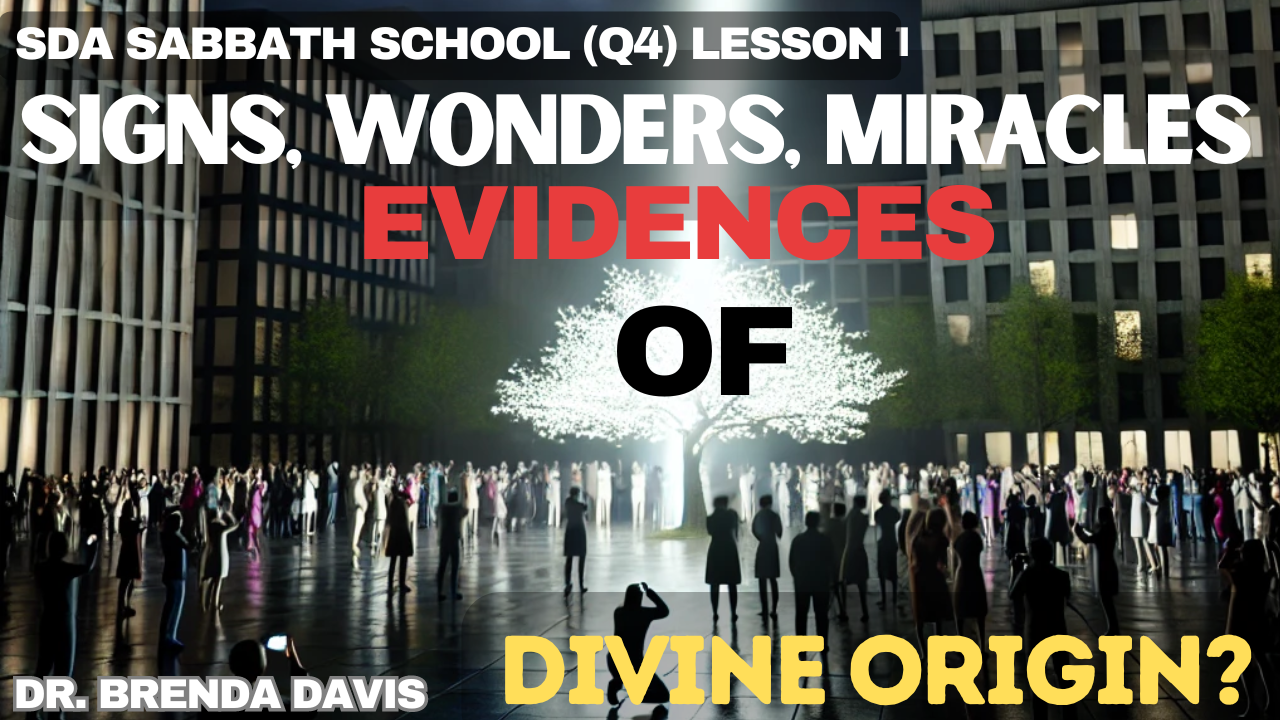Sabbath School Lesson Q 4 God’s Mission, My Mission (Lesson 4) SHARING GOD’S MISSION Part 3-4
QUALITIES OF THE HIGH VALUED MAN
To focus all our energies on what others may see as great while neglecting what God values does not meet God’s approval. What qualities does God value in a man or woman?
We are continuing our look at the love of God for us and his plan (his mission) to bridge the gap between us and him. We observe his mission to bring us back into a relationship with him. In bridging the gap between us and Him, He calls for us to become His disciples and members of his family. But it does not end with his call; a call without a reaction from the one being called is of no use. It is of no value. How should we react to God’s call?
Review our past and present videos at SabbathSchoolDaily.com or visit my YouTube Channel, Sabbath School by Dr. Brenda Ware Davis
You also may obtain the study guide for this series at Sabbath.School or ssnet.org
Let Us Inviting God’s Presence:
Holy Father, open our understanding and give us willing hearts to respond to your call for us to be the person you called us to be. In Jesus’ Name, Amen.
God’s Mission, My Mission
(Lesson 4)
SHARING GOD’S MISSION
Part 3 of 6
Abraham’s Love for Everyone
Love is the basis of godliness. Whatever the profession, no man (or woman) has pure love for God unless they have unselfish love for others. (Christ’s Object Lessons, pp. 383, 384 adapted)
In determining what is a high-valued man or woman in the sight of God, we are looking at the life of Abraham. Thus far, in our short observation of the patriarch Abraham, in our previous video, we discovered in Genesis 18:1-15 that one quality in Abraham that made him a high-valued man was his hospitality.
In Genesis 18:16–33, we discover that Abraham exercised love for all people regardless of culture, race, or ethnicity.
Genesis 18 shows us that Abraham just loved people. So, the second quality of Abraham that makes him a high-valued man is his love. He loved everybody.
Abraham’s love is an important lesson for all of us. The people that lived in Sodom and Gomorrah were wicked. Their values were far different from those of Abraham. Yet, Abraham had a heart filled with love for them and for everyone, regardless of their values. Abraham loved people without any concern for their race, culture, ethnicity, gender, language, or religion.
In Genesis 18:20-21 we see where God tells Abraham about His decision to destroy the cities of Sodom and Gomorrah.
“Then the Lord said, ‘Because the outcry against Sodom and Gomorrah is great and their sin is very grave, I will go down to see whether they have done altogether according to the outcry that has come to me. And if not, I will know” (Genesis 18:20-21ESV).
In humility, with a heart empty of pride, Abraham, with reverence and respect for God, makes the following appeal for Sodom and Gomorrah in Genesis 18:25
“ ‘Far be it from You to do such a thing, to put the righteous to death with the wicked, so that the righteous fare as the wicked! Far be that from You! Shall not the Judge of all the earth do what is just?’ ” (Genesis 18:25, ESV).
It was Abraham’s hope that his love for the people in Sodom and Gomorrah would save everyone in these cities. His concern was not just for the good people of the city but for everyone.
There was no doubt that Abraham knew that the people who lived there were very evil and wicked, with values very different from his.
Who knows what stories he had heard about the terrible practices of the people there and their evil behavior?
But, what we know about the people from what is revealed in Genesis 19, we can see that they were terrible people.
Read the story about Lot and the mob that gathered outside his house in Genesis 19:1–11.
However, regardless of their wickedness, knowing the love of God, Abraham appealed to Him on behalf of the people in Sodom and Gomorrah.
Recognizing that people can change, return to God, ask for forgiveness, and repent, Abraham asked God to show mercy to them.
Abraham knew that as long as they were alive, there was hope. He knew that as long as they were alive, there was a chance that they might repent and be saved.
You see, [Abraham] was a high-valued.
He was a man of faith who pleaded for the inhabitants of Sodom…Himself a sinner, he pleaded on the sinner’s behalf. Such a spirit all who approach God should possess. Yet Abraham manifested the confidence of a child pleading with a loved father. He came close to the heavenly Messenger and fervently urged his petition. . . .
Love for perishing souls inspired Abraham’s prayer. While he hated the sins of that corrupt city, he desired that the sinners might be saved. His deep interest for Sodom shows the anxiety that we should feel for the rebellious. We should cherish hatred of sin, but have pity and love for the sinner.—Conflict and Courage, p. 51.
The manifestation of Abraham’s high value continues. What other qualities of high value does Abraham manifest? Read Genesis 18:23-32 and then continue in this video to Part 4 of 6: Abraham’s Spirit of Prayer.
God’s Mission, My Mission
(Lesson 4)
SHARING GOD’S MISSION
Part 4 of 6 Abraham’s Spirit of Prayer
Abraham was a man of faith who even talked with angels. He had such a connection with God that in Genesis 18:23–32, we find that he asked a favor of the angels.
Abraham’s interceding for the people in Sodom shows that there is power in praying for others. James 5:16 says:
16 Confess your trespasses to one another, and pray for one another, that you may be healed. The effective, fervent prayer of a righteous man avails much. (James 5:16) (Split)
Praying for others is a powerful spiritual experience that opens the door for us to have a personal conversation with God.
The conversation between God and Abraham is a type; it is a symbol or picture of how our prayers should be for other people.
Just as Jesus stands before God our Father, asking for help for us, Abraham, in the same way, pleaded on behalf of the people in Sodom and Gomorrah. He asks God to save them.
Abraham showed his high value in his praying for the people of Sodom and Gomorrah. In a way, His interceding shows us what Jesus does on our behalf.
We will have success in our work for God only if we pray for others like Abraham prayed.
You see, Abraham developed a love for the people in Sodom and Gomorrah and the surrounding cities. Because of his genuine love for the people, His prayer for them was sincere and full of compassion and love.
As a matter of fact, In Genesis 14, we find that Abraham had already fought against some kings who defeated the kings of Sodom and Gomorrah in war. After Abraham’s victory, Bera, the King of Sodom, came to meet Abraham. Bera’s only request was for the freedom of his people.
In Genesis 14:21 he says: “Give the people to me and take the goods for yourself.” (Genesis 14:21, NASB).
What does this say about Bera? Bera words show that he also loves and cares for his people.
As one of high value, Abraham loved the kings of Sodom and Gomorrah, and he loved the people. Thus, he prayed for the kings and their people because his heart was filled with love.
It says in the Book Patriarchs and Prophets that Abraham’s “Love for perishing souls inspired Abraham’s prayer.”—Ellen G. White, Patriarchs and Prophets, p. 140.
God’s high valuation of Abraham stems from Abraham’s heart of love and humility. His heart was empty of all pride. Therefore, his prayers were without pride. Abraham never gave up. He kept asking God to save the People of Sodom and Gomorrah. First, Abraham asked God to save the city of Sodom as long as only 50 righteous people lived there. When God agreed, Abraham continued to intercede. He asked God to save Sodom and Gomorrah even if only ten righteous people were living there.
What does Abraham’s love and intervention for the people of Sodom and Gomorrah say about God’s valuation of a man or woman?
We will not succeed in our work for God without prayer. Our prayers should not be just for ourselves but should also include others.
Nevertheless, it is not our duty to turn people to God. He will touch the hearts of the people we meet. In other words, our words will not change the hearts of our friends or the people we meet. Only the Holy Spirit can do that.
It is our job to pray for the persons whose lives we touch and leave the transformation of the heart in the hands of God.
This point is made in. Romans 8:34 and Hebrews 7:25
Romans 8:34
34 Who is he who condemns? It is Christ who died, and furthermore is also risen, who is even at the right hand of God, who also makes intercession for us. (Romans 8:34)
Hebrews 7:25
25 Therefore He is also able to save to the uttermost those who come to God through Him, since He always lives to make intercession for them. (Hebrews 7:25)
Although Abraham prayed for the people of Sodom and Gomorrah, only a small number of residents of Sodom were saved. Why were they not all saved? To find out, Read Genesis 19:1-29. Then watch my Next Video, Part 5 of 6 Abraham’s Mission.
————————————
Share your results in the comment section below.
Thank you for watching this video. To be notified when my next video comes out, Subscribe to my YouTube Channel, Sabbath School, by Dr. Brenda Ware Davis.
If you enjoyed this video and you want to use it to help in fulfilling God’s mission, click Like…..then….. Share. Thank you for Liking, Sharing, and Subscribing.
Hebron Seventh-day Adventist Church
7902 Wheatly Street
Houston, TX 77088
Watch Past and Present Lessons at SabbathSchoolDaily.com














Post Comment